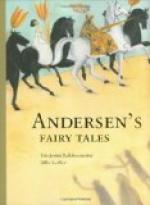We see already, by the foregoing effusion, that he is become a poet; to give further proof of it, however, would in most cases be insipid, for it is a most foolish notion to fancy a poet different from other men. Among the latter there may be far more poetical natures than many an acknowledged poet, when examined more closely, could boast of; the difference only is, that the poet possesses a better mental memory, on which account he is able to retain the feeling and the thought till they can be embodied by means of words; a faculty which the others do not possess. But the transition from a commonplace nature to one that is richly endowed, demands always a more or less breakneck leap over a certain abyss which yawns threateningly below; and thus must the sudden change with the clerk strike the reader.
“The sweet air!” continued he of the police-office, in his dreamy imaginings; “how it reminds me of the violets in the garden of my aunt Magdalena! Yes, then I was a little wild boy, who did not go to school very regularly. O heavens! ’tis a long time since I have thought on those times. The good old soul! She lived behind the Exchange. She always had a few twigs or green shoots in water—let the winter rage without as it might. The violets exhaled their sweet breath, whilst I pressed against the windowpanes covered with fantastic frost-work the copper coin I had heated on the stove, and so made peep-holes. What splendid vistas were then opened to my view! What change—what magnificence! Yonder in the canal lay the ships frozen up, and deserted by their whole crews, with a screaming crow for the sole occupant. But when the spring, with a gentle stirring motion, announced her arrival, a new and busy life arose; with songs and hurrahs the ice was sawn asunder, the ships were fresh tarred and rigged, that they might sail away to distant lands. But I have remained here—must always remain here, sitting at my desk in the office, and patiently see other people fetch their passports to go abroad. Such is my fate! Alas!”—sighed he, and was again silent. “Great Heaven! What is come to me! Never have I thought or felt like this before! It must be the summer air that affects me with feelings almost as disquieting as they are refreshing.”
He felt in his pocket for the papers. “These police-reports will soon stem the torrent of my ideas, and effectually hinder any rebellious overflowing of the time-worn banks of official duties”; he said to himself consolingly, while his eye ran over the first page. “Dame TIGBRITH, tragedy in five acts.” “What is that? And yet it is undeniably my own handwriting. Have I written the tragedy? Wonderful, very wonderful!—And this—what have I here? ’Intrigue on the ramparts; or the day of repentance: vaudeville with new songs to the most favorite airs.’ The deuce! Where did I get all this rubbish? Some one must have slipped it slyly into my pocket for a joke. There is too a letter to me; a crumpled letter and the seal broken.”




